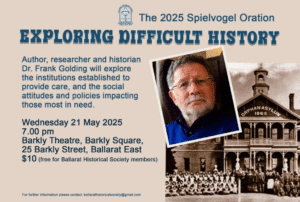I was pleased to present the prestigious Spielvogel Oration by invitation of the Ballarat Historical Society on 21 May 2025. The Oration is an annual event in honour of Nathan Spielvogel, a public intellectual, historian, teacher, broadcaster, and writer (See Weston Bate’s short bio at https://adb.anu.edu.au/biography/spielvogel-nathan-frederick-8607).
I was proud and humbled to follow a long line of historians who have presented the Oration in previous years (including Geoffrey Blainey and Weston Bate).
Here is an abstract of ‘Exploring Difficult History’
Ballarat proudly celebrates its built heritage and community achievements—and rightly so. In this lecture, Dr Frank Golding reminds us that the city also has a less palatable and more challenging social history particularly in regard to impoverished women and their children. The lecture will examine how these difficult challenges were addressed variously by government, community groups, churches and private individuals in the 100-year period from the late 1840s. A hybrid system of institutions—large and small, temporary and long-term—emerged in Ballarat, served their purpose (or not) and eventually declined, to be replaced by new forms of welfare.
There was, in Ballarat, an abundance of warm charity and a pervasive sense of community and Christian duty as evidenced in the various positive responses to destitution, desertion, and family distress. Yet, it must be acknowledged that good intentions sometimes led to unanticipated harmful outcomes, including intergenerational institutionalisation. On the other hand, there were also layers of alarm and contempt; and dominant values and beliefs about moral worthiness served to promote a prevailing ideology that labelled women as ‘fallen’ and children as ‘criminal and neglected’ while their ‘rescuers’ framed themselves as ‘savers’. The many perceived personal failings of the poor were often used to justify coercive policies against the ‘dishonourable’ and ‘undeserving’, while the economic and political context in which hardship arises went unnoticed.
In exploring institutions and policies for the poor, we should understand not just how welfare was offered, but also how it was imposed, negotiated, resisted, withheld, or declined. Challenging the customary history of welfare ‘from above’, Frank draws on discourse analysis, labelling theory and insider knowledge to argue that we need to listen to the voices—whenever they can be found—of those who experienced welfare and were there when history was made. When documents exist, we need to read them ‘against the grain’ and to imagine the world in which records were created as if from the view of the least powerful.
Finally, we need to ask how well we have applied what historian Inga Clendinnen calls the ‘great human resource of past experience’. Unhappily, much of what emerges in the present-day welfare system resembles the mistakes of the past andcontinues to blight contemporary social policy.
